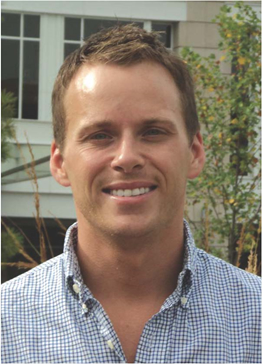Superfund Research Program

Bradley Newsome, Ph.D., from the University of Kentucky (UK) SRP Center, is the 17th recipient of the annual Karen Wetterhahn Memorial Award. The award, which recognizes outstanding SRP graduates and postdoctoral researchers, was presented at the 2014 SRP Annual Meeting in San Jose, CA. The SRP acknowledged Newsome for his contributions at the interface of basic sciences, environmental engineering, and biomedicine for the larger purpose of impacting public health.
Newsome received his doctoral degree in May 2014 under the guidance of UK professor of nutrition and toxicology and UK SRP Center director Bernhard Hennig, Ph.D. During his doctoral work, Newsome investigated how nutrition can modulate the effects of exposure to environmental chemicals as well as research to develop systems that use nanomaterials for removal of contaminants in water supplies. He is continuing this research at UK as a postdoctoral scholar and will also serve as the graduate and postdoctoral training coordinator for the UK SRP Center.
“Newsome is unique because of his combination of intellect, adept communication ability, and leadership skills, as well as his ability to translate complex knowledge into applied assistance to stakeholders locally and internationally,” said Hennig. “I am convinced that Brad Newsome will continue to display the legacy of Dr. Wetterhahn by continued contribution to research and educational needs related to integrating science, technology, and public health needs with diplomatic and development-related goals.”
Reducing health effects from environmental contaminants: from nutrition to remediation
Newsome’s doctoral work sought to address problems related to chlorinated organic pollutants that pollute waterways, soil, and food sources. Newsome investigated how nutrition can decrease the inflammation and oxidative stress associated with exposure to organic pollutants. His work at the UK SRP Center has shown that diet supplementation of polyphenols found in green tea upregulates a variety of antioxidant enzymes that effectively protect against the toxicities of environmental pollutants, such as polychlorinated biphenyls. This work adds weight to the current UK SRP Center research paradigm that nutrition can positively impact the negative human health effects related to chemical exposures near Superfund sites.
Newsome’s current research combines his work with nutrient polyphenols, which have an affinity for chlorinated organic pollutants, with nanomaterial systems for simple and fast removal of contaminants from contaminated water sources. Newsome and his research team have combined quercetin and curcumin, potent antioxidant polyphenols, with magnetic nanoparticles to form nanocomposite materials that quickly bind water-borne organic pollutants in a polymeric matrix. They can then apply a magnetic field to the system that rapidly removes the material-bound pollutants, leaving detoxified water.
Improving global public health outside of the lab
In 2010, Newsome halted his graduate work to spend about a year in Swaziland, Africa. There he designed and directed the construction of a large clean water collection system for a local community to battle drought and widespread health issues associated with contaminated drinking water. He also taught math and science to students and teachers and worked with the local hospital and the University of Cape Town on a public health research project.
Upon returning to UK SRP, Newsome shifted his work from a main emphasis on nutrition to a focus on contaminated drinking water.
“This experience served to refocus my research efforts upon returning to graduate school toward the development of innovative strategies to address the major global health concerns associated with water pollution,” said Newsome.
As a result of Newsome’s global humanitarian work and scientific research, he hopes to become involved in global health policy to continue to promote public health. Newsome completed an education policy internship with the Council of State Governments, which familiarized him with science and technology research, education policy needs, and their translation for development-related goals. He is also working as part of the UK SRP Center Training and Research Translation Cores to more effectively tie multidisciplinary research and training with effective communication and stakeholder engagement.
The NIEHS congratulates Newsome on his accomplishments and wishes him continued success in his career.


